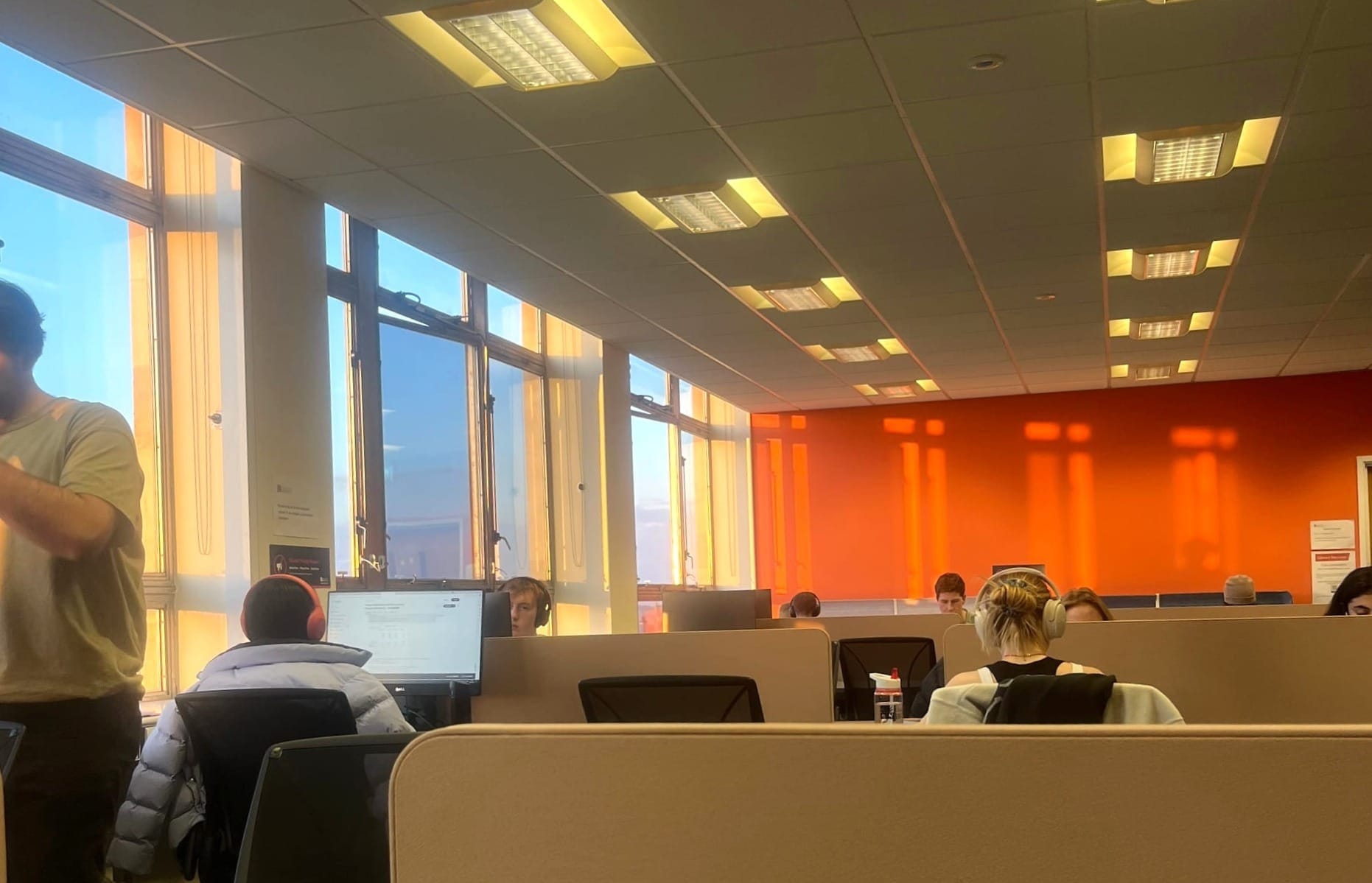By Olivia Howard, Third Year, Geography
The digital classroom represents a significant shift in education with almost a third of university courses still employing hybrid teaching. Digital planners like Blackboard simplify the organisation of announcements, timetables, coursework, and assignments, requiring minimal effort from students. Does this pose a problem for the future of university education?
Communication between students and tutors has largely shifted to email and other digital means, making in-person meetings a rare occasion. While some students thrive with the flexibility of online learning, others struggle due to the lack of direct interaction and overwhelming material, especially when pre-recorded content adds to their workload within a limited time. These issues are increasingly pertinent, with high university fees under scrutiny for the lack of in-person teaching and the overall future of student learning.
While digital learning generally improves the academic experience by centralising resources, there are still areas that need improvement. Increasing reliance on digital classrooms has transformed the academic landscape, with some units or sub-units now being taught entirely online. This shift, while facilitating flexible learning, has also introduced significant challenges. It is being found that Student engagement with in person lectures is decreasing. Lectures are often viewed as a task to complete or a mandatory attendance requirement, rather than as valuable learning opportunities. Recorded lectures impact the quality of education students are receiving as they know they can go back and rewatch it at any time. If you don’t understand something, have an appointment, etc. re-watching a lecture is as though you never missed it.
However, this can become a problem when there are 10 hours of content to catch up on, caused by students’ overreliance on this resource.
Epigram spoke to several students who found that pre-recorded/recorded lectures increase their procrastination, cause a lack of real-time interaction, and encourages students to take more hours at work to earn money resulting in overwhelming workloads. Lectures that involve an early start, or fall at inconvenient times often result in students watching from their beds, on the bus, or through headphones when walking home. This convenience, while appealing, can lead to a lack of prioritising learning. Another group of students suggested that online assessments raise concerns about academic integrity, as various factors can compromise the authenticity of students’ work. Although prohibited by the university, there is no real way to know if students do their online exams on Facetime, or while using social media, as it can’t be monitored.
Additionally, students face immediate challenges in remote learning, including limited access to reliable internet and appropriate devices. When a Zoom link doesn’t work and students can’t contact their lecturers, resentment can build, creating difficult relationships between the university and its students. Before the recent updates, Blackboard was particularly controversial with Bristol students. Inconsistent page layouts and varying file names used by unit leads across different courses heightened student frustration.
University is often seen as a rite of passage, filled with memorable experiences like being late to a lecture, falling asleep in class, or meeting future best friends and partners. Universities’ digital landscapes can have a detrimental effect on the traditional campus experience. Fewer in person lectures, less time on campus, and reduced opportunities for networking and building relationships. Less engagement in seminars means that fewer students can bond over shared experiences, whether they are interesting, difficult, or annoying. Reduced face-to-face interactions with peers and teachers have led to increased feelings of loneliness and anxiety. This isolation hampers the development of essential social skills. The lack of varied environments and physical activity throughout the day contributes to general lethargy and low energy levels.
However, refocusing on in-person tutor meetings, tutor group sessions, and project collaborations can bring students back onto campus, fostering social network development. This has a compound effect on extra-curricular activities, as students who engage in lectures and meetings are more able to mix with their peers, gaining confidence in both academic and social settings.
Discussions with staff also suggested a growing trend of declining attendance. A university professor noted in an interview with Epigram that fewer students are attending live lectures, opting, instead, to watch recordings. They commented that this shift was evident in student social areas, where conversations previously revolved around who was going to which lecture and now are concerned with whether others are even attending.

Many also have concerns about students’ overreliance on AI writing tools for creative tasks. Whether planning essays or finding equation answers, ChatGPT is always at hand. Interviewees commented that where they would previously turn to JSTOR or Google Scholar, now they might simply ask ChatGPT. This shift poses a threat to student’s research skills and their ability to engage deeply with academic material.
To gain a deeper understanding of how people are experiencing the shift to digital classrooms, Epigram interviewed several students from Bristol University. The most common answer to ‘What is the biggest challenge you face with digital learning’ was that there is too much content per week for students to consume and work on ahead of seminars, tutorials, and discussion groups/group work. Online videos and lectures, as well as those in person, lead students to experience severe levels of stress. Interestingly, one student spoke about group work changing with an increase in digital learning. ‘In the past group assignments were a really fun way of meeting new people and working on a task where at the end many of you would continue to hang out socially’. They went on to explain that group work ‘is a stark reminder of the impersonal nature of university learning today’.
'It can be difficult to know exactly what your professors are looking for': Managing academic pressure at university
Spotlight | More than just a shop: Visiting the Clifton Community Bookshop
Multiple other student conversations have led to the conclusion that as a result of digital learning; group work has become an informal shared google doc operation that requires little interpersonal interaction, and even less social cohesiveness. However, there are benefits to these changes, one Geography student told Epigram that lectures being recorded allows her to ‘work part time alongside her degree and thus alongside the student loan’ and be able to support herself while living in Bristol.
Ultimately, the digital classroom is a complex and rapidly evolving environment. The pros and cons must be assessed by students and staff on what they feel is appropriate and beneficial for learning and well-being. With technological advancements evolving exponentially, the future of university learning appears even more complicated.
Featured Image: Epigram / Nel Roden
What do you think is the biggest challenge or advantage of digital learning at university?









